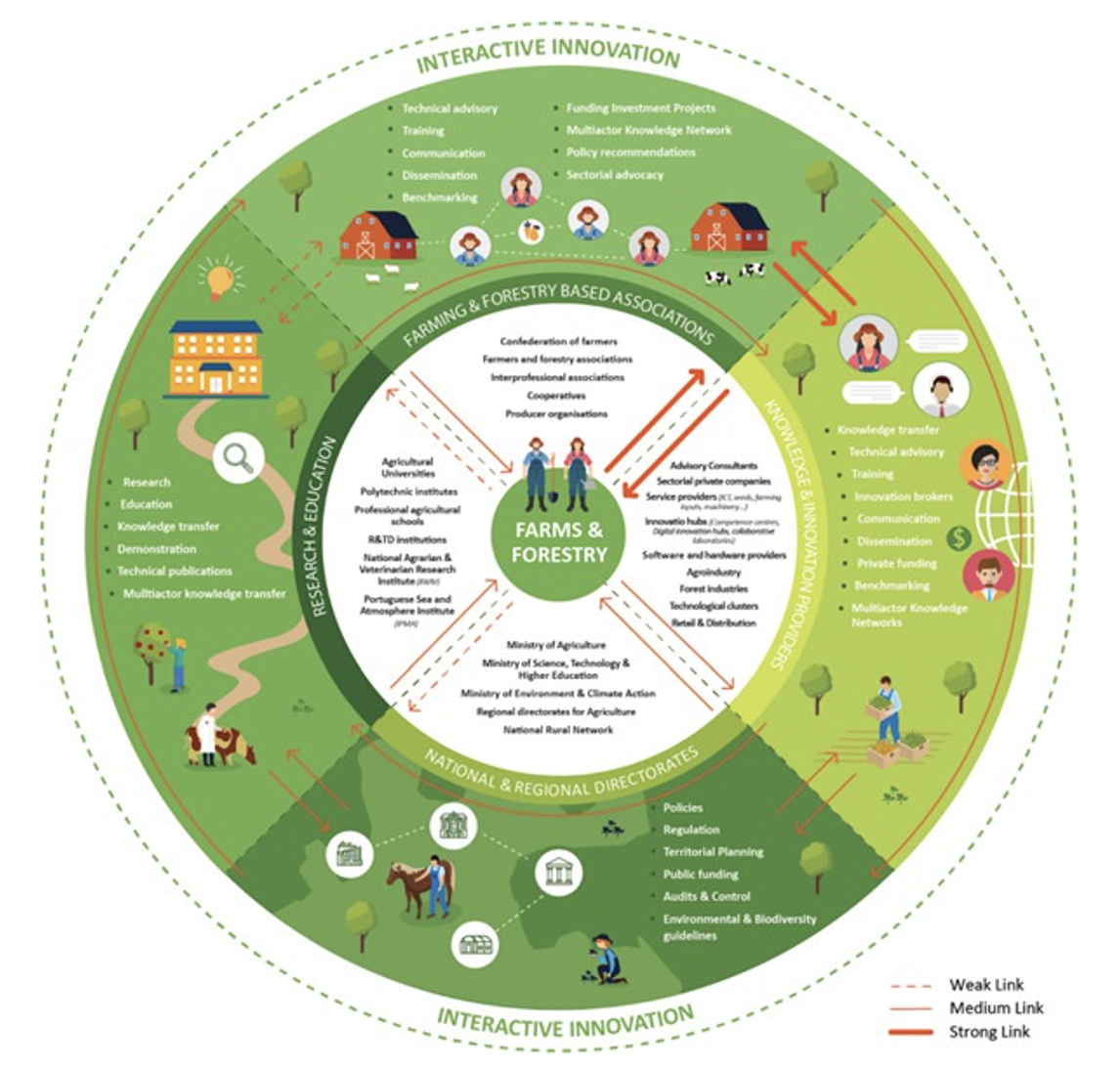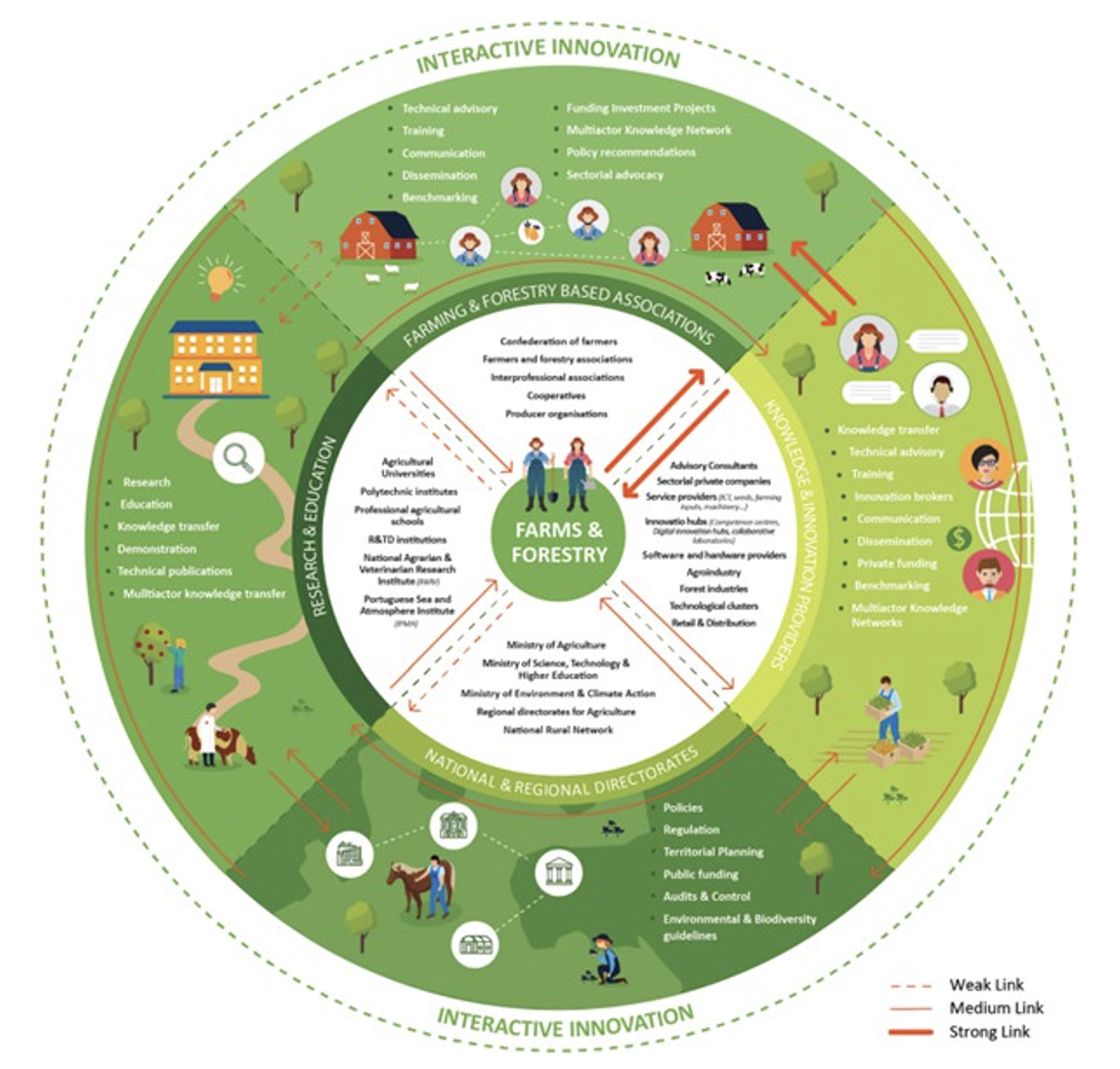2024
AKIS coordination bodies
governance

Portugal's Agricultural Knowledge and Innovation System (AKIS) is marked by a wide array of participants, each with varying degrees of interaction, a fragmented structure, and limited national-level coordination. These participants can be grouped into four primary sectors, where farmers and forestry professionals form the central pillar.
The advisory services are mainly performed by farmer-based organizations, while information and knowledge dissemination are largely managed by smaller, private entities. Additional key AKIS actors include those focused on research, education, and both national and regional directorates of the Ministries, all of which operate under the coordination of the National Government.
The strongest connections are observed between the farming and forestry groups and their affiliated associations, as well as the knowledge and innovation service providers. In contrast, the research and education entities maintain only loose connections with farmer-based organizations. Additionally, connections between the farms, national and regional directorates, and research institutions remain underdeveloped.
In general, the Portuguese Research and Education has limited dialogue to the other AKIS actors.
Knowledge in the agricultural sector and associated innovation has increased in recent years, mainly due to a greater link between the different actors in the value chain, and the existence of many innovation projects at national and international levels.
Further support for the AKIS structure is anticipated under the CAP Strategic Plan, which plans to leverage other financial resources, including the Cohesion Policy Funds, Horizon Europe, and the Recovery and Resilience Plan (RRP). These instruments are intended to bolster the research, development, and training sectors aligned with national regulatory frameworks, thereby enhancing Portugal’s capacity for agricultural innovation and education.
Figure 1: Portuguese AKIS diagram

Source: i2connect (2020)
The political relevance given to AKIS strategies in the context of the CAP Strategic Plans (SPs) 2023-2027 has certainly highlighted the opportunity of defining governance bodies aimed at coordinating the AKIS-relating interventions and actors in view of their better implementation and contribution to the cross-cutting and specific objectives of the CAP SPs.
Particularly, the AKIS coordination body is indicated by the CAP SP 2023-2027 as a point of contact of the European Commission and of the European CAP Network.
In the case of Portugal, a national decree (Decree-Law no. 5/2023) established that the AKIS Technical Coordination Body is the DGADR - General Directorate for Agriculture and Rural Development.
1. Who is the AKIS CB
The technical AKIS coordination body in Portugal is the Directorate-General for Agriculture and Rural Development (DGADR) of the Ministry of Agriculture and Food, that functions through the support of the Portuguese CAP Network. This body facilitates collaboration between various stakeholders, including those responsible for knowledge transfer, research, advisory services, and innovation partnerships, as well as the Agricultural and Forestry Advisory Service (SAAF), the Strategic Plan for the Common Agricultural Policy (PEPAC), and the Portuguese CAP Network (RN PAC), all of which are under the auspices of DGADR.
2. Composition of the AKIS CB
The technical coordination body represented by the DGADR of the Ministry of Agriculture and Food will establish an AKIS Follow-up and will be assisted by a Monitoring Group (GA AKIS) to approve AKIS action plans, monitor implementation, and address capacity building needs. The GA AKIS will integrate all key actors of the AKIS, with a particular focus on the SAAF and technical support.
The AKIS Follow-up and Monitoring Group, overseen by DGADR, brings together representatives from:
In addition to this core team, other members may be called in as necessary, including representatives from Portugal’s main Farmers’ Confederations (CONFAGRI, CAP, CNA, AJAP), advisory bodies, the PEPAC central and regional management teams, the Institute for Nature Conservation and Forests (ICNF), the Directorate-General for Employment and Labor Relations (DGERT), the Authority for Working Conditions (ACT), and the Managing Authorities for EAFRD and other related funds.
An Advisory Council will also be formed, drawing from leaders in the farmers’ federations (CONFAGRI, CAP, CNA, AJAP), forestry organizations, Federação Minha Terra (the Portuguese GAL-LEADER Federation), environmental NGOs, the CCISP (Coordinating Council of Higher Polytechnic Institutes), the CRUP (Council of Rectors of Portuguese Universities), and designated Competence Centers.
The primary tasks of the Follow-up and Monitoring Group include reviewing and endorsing the AKIS Action Plan and its evaluation framework, ensuring a thorough review at least biennially. This Action Plan, designed collaboratively through a bottom-up process with input from the Advisory Council, aims to enhance alignment across resources and policies while setting out key initiatives in areas such as:
Box 1: Portuguese CAP Network
Portugal's National CAP Network was launched on 28 November 2023, marking the end of the former National Rural Network (2014-2022). To ensure the functioning of the National Rural Network, there is a central animation structure (Technical Animation Structure) with regional centres in the Regional Agriculture and Fisheries Directorates and in the Regional Secretariats of the Autonomous Regions.
The main objectives oft he Portuguese CAP Network are
- Promoting participation and joint work among rural development agents.
- Transferring good practices and new knowledge to qualify the intervention of rural development agents.
- Improving the design and implementation of rural development policy measures.
- Promoting the image and potential of rural territories.
The CAP Network’s activities fall within specific Intervention Areas designed to ensure the Network's effectiveness in meeting its mandated objectives (per Article 113):
- Network Technical Team Operations: Encompassing the essential functions for running the Network's core administrative and operational tasks.
- Collaboration and Peer Exchange: Supporting activities that foster cooperation and mutual learning across network participants.
- CAP Observatory: This area focuses on efforts to track and assess progress in agriculture and rural sectors, aligning with specific objectives. It involves initiatives to enhance the monitoring process and develop tools that improve PEPAC's implementation quality.
Moreover, the CAP Network aims to strengthen Portugal's AKIS by promoting knowledge sharing, innovation across borders, improved advisory services, and digital transformation in agriculture. Through its Innovation Group, which gathers main AKIS actors, the Network’s activities align with the AKIS Action Plan and are overseen by DGADR to support effective interactions and involvement of all stakeholders. In this area, an important responsibility of the national CAP network is coordinating and dynamizing the AKIS Platform, a digital platform that integrates and centralizes knowledge and innovation in place within the agricultural sector, through facilitating a better coordination among various AKIS actors, such as farmers, researchers, advisors, and policymakers (for more information read AKIS-in-practice! 4.3 – Portuguese AKIS Platform: Driving Innovation and Collaboration in Agriculture).
The Portuguese CAP Network includes a wide array of stakeholders from Portugal's agricultural, environmental, and rural sectors. The members are more than 3,000 (source: https://www.rederural.gov.pt/membros-da-rede) including:
- Farmers / Agricultural Entrepreneurs.
- Cooperatives.
- Associations.
- Local Action Groups (LAGs).
- Federations / Confederations.
- Non-Business Entities of the R&D&I System (ENESII).
- SMEs (Small and Medium Enterprises).
- Sole Proprietors.
- Central Administration Bodies and Services.
- Regional Administration Bodies and Services.
- Local Administration Bodies and Services.
- Foundations.
- Operational Groups members.
It is possible to become a member of the Portuguese CAP Network by completing an online registration form. A full list of current members is available on the network's official website.
3. Functions attributed to the AKIS CB
The AKIS Coordination Body in Portugal has the following key functions:
These functions are essential for the effective coordination and continuous improvement of the Agricultural Knowledge and Innovation System in Portugal.
4. Procedures for interplaying with other AKIS actors and with the MA of the CAP SP
The procedures for engaging with other AKIS actors and with the Managing Authority of the CAP Strategic Plan have not yet been clearly defined.
To ensure the replicability of this practice, several key conditions should be in place:
This configuration of a collegial AKIS CB brings together the actors that are already playing some institutional and operational key functions/activities within the local AKISs.
Portuguese CAP Strategic Plan 2023-2027.